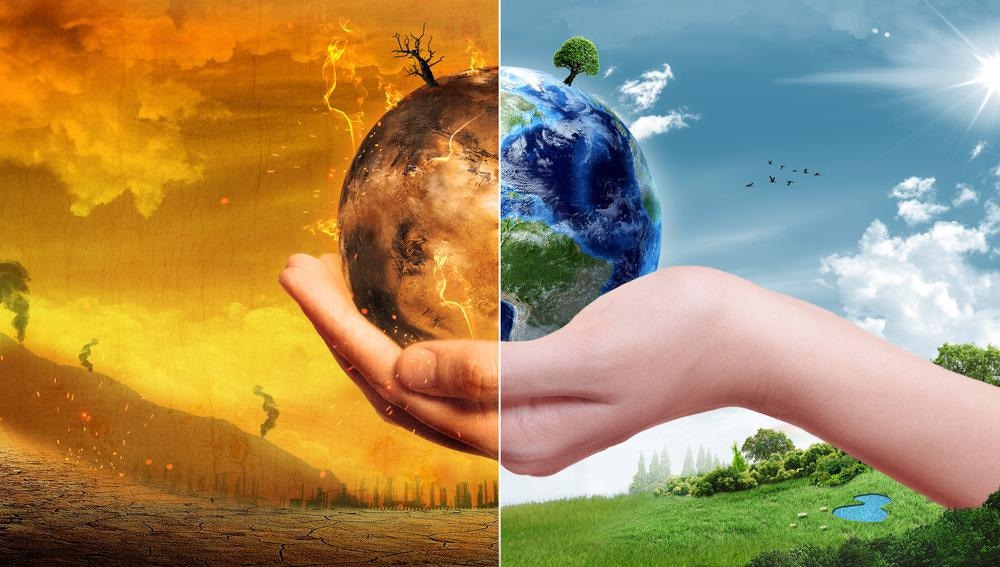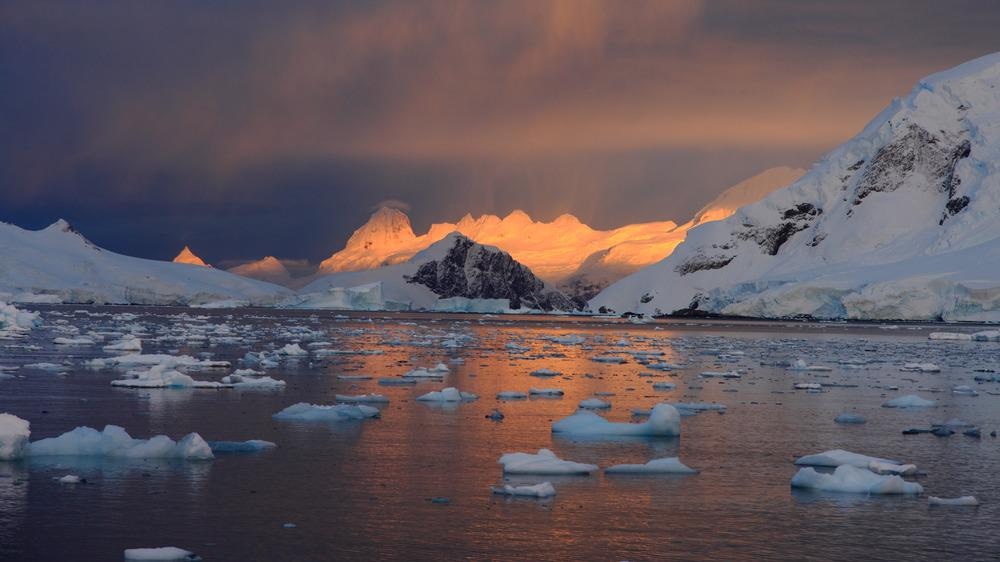Korean scientists working at Pohang University of Science and Technology (POSTECH) have been researching the lengthening of summer under 1.5 ˚C and 2 ˚C conditions using several global models. Under the 2 ˚C model scenario, they reveal that summers will extend by an average of three weeks across Asia, Europe, and the US. However, if warming is limited to 1.5 ˚C, the three-week lengthening is reduced, whereby it still extends, but by 12 or 13 days.

Image Credit: ParabolStudio/Shutterstock.com
The Paris Climate Agreement to Limit Temperature Rise
The temperature goal set at the 2015 Paris Climate Agreement was to limit global temperature rise to below 2 ˚C, pre-industrial levels, preferably 1.5 ˚C.
At COP26, Glasgow 2021, the follow up to Paris, new data from Climate Action Tracker revealed current global policies are failing to limit warming, which means the world is currently on track to see temperatures rise by at least 1.7 ˚C.
Limiting warming to 1.5 ˚C is less viable unless drastic action is taken.
Many regions are going to experience the effects of longer summers and everything those will bring. For most, the consequences will not be positive.
Best Case Climate Change Scenario
If data modeling is accurate, and global temperatures are still rising rapidly, it means that even if policies changed today and climate change was halted, the best-case scenario would mean it will still take thousands of years for the climate to stabilize again.
Excess CO2 would remain in the atmosphere and continue to exert a warming effect. The oceans and surface air temperature would also continue to warm due to thermal ocean expansion. Sea levels will continue to rise as glaciers and ice sheets continue to melt.

Image Credit: Achim Baque/Shutterstock.com
Geological processes that bury CO2 in ocean sediments occur over thousands of years, so scientists would need to find a way to replicate this process on a much faster timescale, but only if the political will is there and financed by stakeholders.
Critics of carbon capture and carbon storage, such as Friends of the Earth, have claimed attempts at such schemes have not been successful so far, and distract from serious investment in renewable energy, storage, and energy efficiency.
Worst Case Climate Change Scenario
If climate change is not stopped, the scenario of runaway climate change will occur, and all life on the planet would eventually cease to exist.
Runaway climate change is caused by positive feedbacks, whereby the planet absorbs more solar radiation than it can radiate back to space. The hotter the surface temperature gets, the faster it warms up and passes a tipping point where all human intervention then becomes futile.
Venus is an example of where the planet’s surface grew so hot, surface water boiled, was unable to condense into rain, and leached out of the atmosphere into space, leaving behind a hot, dry planet. A study reveals that even drought-tolerant microbial life, such as that found on Earth, almost certainly cannot now exist on Venus.
Mass extinction of all known species, including humans, will start to occur due to crop failures, water, and air pollution, drought, floods, famines, forest fires, chronic disease and starvation, severe and erratic weather conditions, industrial collapse, and economic ruin.
Earth will become inhabitable as society breaks down and cooperation for survival fails. Many of these events are already happening, with many citizens, including climate activists and some scientists, believing time to take action may have already passed. Others believe mitigating actions can still avert the worst effects of climate change and prevent a runaway scenario, including most leaders at COP26.
Pohang University Extending Summers Research
The research conducted at Pohang University has shown global temperatures have already risen by 1.1 ˚C above pre-industrial levels, and that even a rise of just half a degree has significant consequences.
Different types of experiments conducted over ten years all produced very similar results, which included All-Hist (2006-2015), Plus 15 and Plus 20 experiments, and Coupled Model Inter-comparison Project phase 5 coupled GCM simulations.
The experiments showed warming periods at the beginning and end of seasons becoming more frequent. This has a huge impact on agriculture, public health, ecosystems, and energy sectors, which require further assessment and mitigation plans to be put in place, above those already agreed at COP26.
High-risk areas for summer extending are East Asia, the US, and the Mediterranean, or mid-latitude lands, with the highest effects occurring in low latitudes, rather than in high latitudes.
If warming increases by 2 ˚C above pre-industrial levels, the number of people affected by water shortages will rise by 50 percent. The sea level is likely to rise by 10 cm, but if it can be held at 1.5 ˚C as per the Paris Agreement, it means 10 million people would no longer be threatened by the loss of land, homes, and livelihoods from sea level rise.
The research also showed that day-to-day variability in temperatures was important for determining regional differences in hot day temperatures. That is to say, where lower variability occurs, there is a stronger increase in summer-like days overall and vice versa. The frequency of summer-like days decreases if warming models are limited to 1.5 ˚C, indicating the high importance of striving to keep the hope of 1.5 ˚C alive.
Pohang scientists revealed that follow-up analysis of Southern Hemisphere seasonal length is to be published in a separate study, and that summer expansion upon oceans, ecosystems and regional impacts needs to be considered with care, in line with marine heatwave.
Glasgow Climate Pact Outcomes
The outcome of COP26 was the Glasgow Climate Pact, which included three significant commitments on tackling climate change.
The first is a pledge to end and reverse deforestation by 2030, signed by 100 countries, including Indonesia and Brazil.
Second, is a pledge to reduce methane emissions by 30 percent by 2030, signed by 90 countries. The last was a joint declaration by the US and China to collaborate on their efforts to keep temperatures within 1.5 ˚C.
There was also a vast range of other statements and declarations by World Leaders, which are detailed over three pages on the COP26 Outcomes page of UKCOP26. None of them specifically mitigate extended summers, but all of them combined will indirectly have a positive effect if actioned.
If climate pledges are acted upon, limiting climate change to 1.5 ˚C may still be achieved, and summers might extend by just 12 or 13 days. If not, then a three-week extension to summer is highly possible, and with that, untold suffering, species extinction, and ecosystem destruction, including even warmer seas. This would be coupled with displacement and mass migration of millions of people escaping sea level rise, food and water shortages, extreme weather conditions, and loss of homes and livelihoods, which will increase with every minor temperature rise above 1.5 ˚C.
References and Further Reading
Lengthening of Summer Season over the Northern Hemisphere under 1.5˚C and 2˚C Global Warming. (12.23.2021) Park.B, Min,S, Weller.E in Environmental Research online (accessed 02.07.2022) https://iopscience.iop.org/article/10.1088/1748-9326/ac3f64/pdf
2˚C warmer Earth extends Summer by 3 weeks (01.25.2022) Pohang University of Science & Technology (POSTECH) in EurekAlert! Online (accessed 02.07.2022) https://www.eurekalert.org/news-releases/941149
COP26: success or failure? A correspondent’s verdict (11.19.2021) Pomeroy.R in World Economic Forum (online) (accessed 02.04.2022) https://www.weforum.org/agenda/2021/11/cop26-success-or-failure/
Glasgow’s 2030 credibility gap: net zero’s lip service to climate action in ClimateActionTracker.org (online) (accessed 02.04.2022) https://climateactiontracker.org/publications/glasgows-2030-credibility-gap-net-zeros-lip-service-to-climate-action/
If Emissions of Greenhouse Gases were Stopped, would the climate return to conditions of 200 years ago? (2020) in The Royal Society online (accessed 02.04.2022) https://royalsociety.org/topics-policy/projects/climate-change-evidence-causes/question-20/
Could the runaway greenhouse effect come to earth? (08.11.2010) Upholt.B in Wren online (accessed 02.04.2022) https://www.wren.co/blog/posts/could-the-runaway-greenhouse-effect-come-to-earth
Carbon Capture and Storage won’t work critics say (01.19.2021) Brown.P in Eco-Business. (Accessed 02.07.2022) https://www.eco-business.com/news/carbon-capture-and-storage-wont-work-critics-say/
Life on Venus is impossible because of lack of water, study suggests. (06.30.2021) Pultarova.P, In Scientific American online (accessed 02.08.2022) https://www.scientificamerican.com/article/life-on-venus-is-impossible-because-of-lack-of-water-study-suggests/
What happened at COP26? (11.04.2021) Jackson.S in Ecologi online (accessed 02.08.2022) https://ecologi.com/articles/blog/what-happened-at-cop26
COP26 Outcomes (Nov 2021) in UKCOP26.org online (accessed 02.08.2022) https://ukcop26.org/the-conference/cop26-outcomes/page/3/
Disclaimer: The views expressed here are those of the author expressed in their private capacity and do not necessarily represent the views of AZoM.com Limited T/A AZoNetwork the owner and operator of this website. This disclaimer forms part of the Terms and conditions of use of this website.